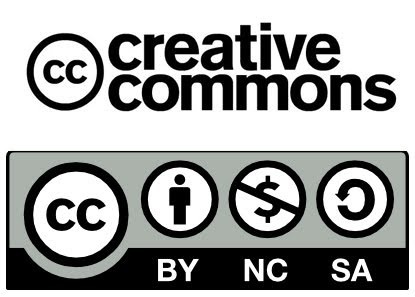Cate Russell-Cole's Blog, page 14
April 6, 2014
#Character Archetypes Treasure Troves for #Writers
I promised myself this year, that I would get back to fiction writing and I will… write that is… once I stop having a field day planning characters personalities, strengths and weaknesses; and plotting about how I can weave all that into plots.
Delve into the inspiring world of character archetypes and see what comes out. There are a few hundred to choose from and you will be intrigued by how assigning roles to people (especially couples), fuels ideas!
If you are asking, what is an archetype, here is the definition: a recurrent symbol or motif in literature, art, or mythology; mid 16th cent.: via Latin from Greek arkhetupon ‘something moulded first as a model.’
Pure Gold: http://www.myss.com/library/contracts/three_archs.asp
The more I look through this site, the more I find. There are hundreds! http://tvtropes.org/pmwiki/pmwiki.php/Main/Characters Click on the names of the types for more information, it’s not obvious they are hotlinks to more information.
Romantic Women in Fiction Archetypes: http://www.likesbooks.com/78.html
Common Jungian Archetypes: http://www.soulcraft.co/essays/the_12_common_archetypes.html
Archetypes from the Heroes Journey (image is below): http://adulted.about.com/od/howtos/a/archetypes.htm
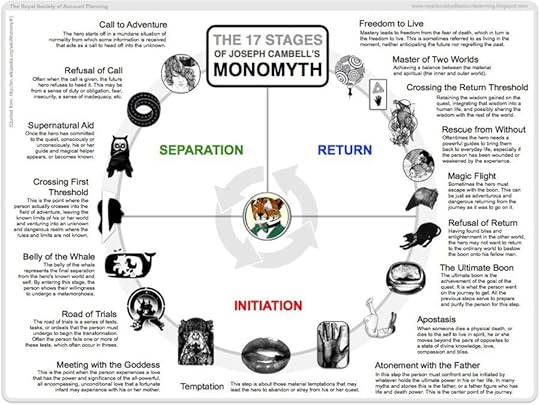
Original Source Embedded in Graphic
This blog post by Cate Russell-Cole is licensed under a Creative Commons Attribution-NonCommercial-ShareAlike 3.0 Unported License. You are free to share and adapt it.
Filed under: Character and Plot Construction, Writing Resources Tagged: Archetypes, author, characterisation, discovery, fiction, ideas, inspiration, Jung, resource, Romantic Women, The Heroes Journey, writer, writing








April 3, 2014
#atozchallenge Ideas ~ Hard Letters to Fill: X and Z Word List
 If you get stuck finding A to Z Challenge topics for the letters X and Z, these may help. They come from my 1920′s Hordern’s Home Dictionary and some words are out of common use. These words are great short story prompts. Q words came out in yesterday’s post.
If you get stuck finding A to Z Challenge topics for the letters X and Z, these may help. They come from my 1920′s Hordern’s Home Dictionary and some words are out of common use. These words are great short story prompts. Q words came out in yesterday’s post.
X Words
- Xanthein: yellow colouring in flowers which is water soluble.
- Xantippe: an angry woman.
- Xiphias: a sword shaped comet, resembling a sword.
- Xylograph: a wood engraving, or impression from a wood block.
- Xylopyrography: producing pictures on wood by charring with a hot iron; poker painting.
- Xyster: a surgeon’s instrument for scraping bones (sorry, but you are always scraping the bottom of the barrel for X words as there are so few…)
Z words
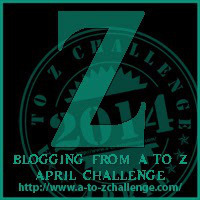 - Zanella: a twilled fabric which was once used for covering umbrellas. (Remember, this is a 1920s dictionary.)
- Zanella: a twilled fabric which was once used for covering umbrellas. (Remember, this is a 1920s dictionary.)
- Zareba: an enclosure against enemies or wild animals.
- Zax: an instrument for cutting slate.
- Zeitgeist: the spirit of the time.
- Zeugma: the connection of two nouns with an adjective or verb, suitable to only one of them.
- Zingaro: a gypsy (zingari is the plural)
- Zoanthopy: a psychological disorder in which someone believes they are one of the “lower” animals. (Lower may mean less intelligent.)
- Zoetrope: an optical instrument representing pictures as if alive. (Perhaps the early silent films were Zoetropes. Does anyone know?)
- Zonulet: a little zone.
- Zoograft: tissue from a lower animal, grafted onto a human being. (Use of pig valves in heart surgery would be a zoograft.)
- Zoolatry: animal worship (successfully achieved by cats in Egyptian times and they are still trying to bring this fad back…)
- Zounds: expressing anger or wonder.


Filed under: What's On Tagged: A to Z challenge








April 2, 2014
Reading Challenges of a Visually Impaired Writer in the Digital World: Guest Post by Kerry Kijewski
This is an awesome post. Next time Dreamweaver nags me about some aspect of my site not being accessible, I will listen.
 Originally posted on change it up editing:
Originally posted on change it up editing:
I recently met author Kerry Kijewski on
my Facebook page
. She commented that she really enjoyed the writing- and publishing-related posts on my page, but she couldn’t always access the links because she is blind. After some back-and-forth discussion, I learned that if I just added the links to the comments section, Kerry could access them with her reading software.
That conversation got me thinking about the other accommodations a blind reader/writer might need, so I asked Kerry to share her thoughts with us. Before I met her, I’d never considered how technology helps or hinders the creation and consumption of digital content. Now I know a bit more, and so will you:
I was born blind, but I had enough sight when I was younger to read and write large print. In the beginning days of computers I could use large print magnification programs. That seems like another lifetime to me…
View original 1,036 more words
Filed under: Writing Resources








April 1, 2014
#atozchallenge Ideas ~ Hard Letters to Fill: Q Word List
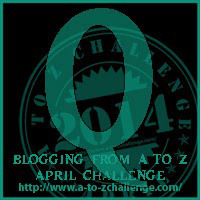 If you get stuck finding A to Z Challenge topics for the letter Q, these may help. They come from my 1920′s Hordern’s Home Dictionary and some words are out of common use. These words are great short story prompts. The challenge also accepts poetry, quotes, photoblogs and artwork. It’s about creativity. Try and use 100 words or more.
If you get stuck finding A to Z Challenge topics for the letter Q, these may help. They come from my 1920′s Hordern’s Home Dictionary and some words are out of common use. These words are great short story prompts. The challenge also accepts poetry, quotes, photoblogs and artwork. It’s about creativity. Try and use 100 words or more.
What is the challenge? It is “the brainchild of Arlee Bird, at Tossing it Out, the A to Z Challenge is posting every day in April except Sundays (we get those off for good behavior.) And since there are 26 days, that matches the 26 letters of the alphabet. On April 1, blog about something that begins with the letter “A.” April 2 is “B,” April 3 is “C,” and so on. You can use a theme for the month or go random – just as long as it matches the letter of the alphabet for the day. We recommend short posts, turn off Word Verification, and visit five blogs (or more) a day beginning with the one after yours on the list.”
X and Z come out at the end of the week.
Q words
- Quardangle: a shape with 4 angles. In school, we used to assemble in the Quadrangle. Perhaps some school days topics?
- Quadrat: used in printing presses, this is the small piece of metal they use to make spaces between words. It is lower than the letters, so it gets no ink on it.
- A four leaf clover is a quadrifoliate. As is anything with four leaves attached to a common stalk. If something has five leaves it is a quinquefoliate.
- A quadrille is not just a dance, it is also four people playing a game with forty cards.
- Quaquaversal: inclined outwards in all directions from a single point; a pyramid would be on of these, or an inverted cone.
- A quarrel is also an arrow with a square head and a diamond shaped pane of glass. Arguments can also be included.
- Quasimodo is the first Sunday after Easter.
- A quean is a worthless woman; a wench.
- Quiddity: a trifling nicety; a captious question. An insincere, “How are you?” is one.
- Quidnunc: one that is curious, or pretends to know everything.
- Quirites were ancient Romans in their evil capacity.
- Quondam: a former friend.
- Quotidian: anything recurring daily.


Filed under: What's On Tagged: A to Z challenge








March 30, 2014
Writing Historically Based Books: Author Philippa Gregory
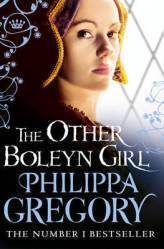 “Philippa Gregory was an established historian and writer when she discovered her interest in the Tudor period and wrote the novel The Other Boleyn Girl which was made into a tv drama, and a major film. Now, six novels later, she is looking at the family that preceded the Tudors: the magnificent Plantaganets, a family of complex rivalries, loves, and hatreds.” Sourced from her web site, http://www.philippagregory.com
“Philippa Gregory was an established historian and writer when she discovered her interest in the Tudor period and wrote the novel The Other Boleyn Girl which was made into a tv drama, and a major film. Now, six novels later, she is looking at the family that preceded the Tudors: the magnificent Plantaganets, a family of complex rivalries, loves, and hatreds.” Sourced from her web site, http://www.philippagregory.com
These videos are on how she researches her books and is drawn to work on the main characters. It’s a fascinating process, which I enjoyed hearing about. If you are a lover of research or historical fiction, you’ll be inspired by watching these clips.
Filed under: "Dose of Inspiration" Video Tagged: author, characterisation, conflict, creativity, fiction, goals, historian, history, ideas, inspiration, non-fiction, passion, Philippa Gregory, plot, research, resource, The Other Boleyn Girl, The Tutors, writer, writing








On Continuity in Creative Writing
As I am world building for The Chronicles of Mirchar, this is an issue which is coming up more and more and is critical to polished, believable writing. One other ingredient is needed too: don’t rush it! Writing a draft in a month is one thing, but it takes a great deal more to produce a novel. Many thanks to Victoria Grefer for her helpful posts. They keep saving my bacon!
 Originally posted on Creative Writing with the Crimson League:
Originally posted on Creative Writing with the Crimson League:

One necessary component of engrossing, readable fiction is always cohesiveness: and today, as I edit “The Crimson League” for its second edition release this Autumn, I am thinking more and more about the role continuity plays in cohesiveness.
There are so many forms and levels of continuity. A large part of editing–not the whole, certainly, but a large chunk–involves keeping track of and maintaining, or improving, continuity. You could dedicate an editing pass or two JUST to continuity issues. And that’s what I want to discuss today: continuity issues.
What are the major things we authors can look out for as we edit a draft for continuity?
CHARACTER CONTINUITY: PHYSICAL TRAITS
Personality cohesiveness–asking yourself, “would this character, believably, say or do these things?”–is a different issue. I am talking more basic, surface-level things here.
Does a character’s eye color change from scene to scene?
Does a character, mid-scene, shift from…
View original 669 more words
Filed under: Writing Resources








March 27, 2014
When the roller coaster you are on catches fire… writing survival

Monet is writing his own novel using only his subconscious. Look Mum, no paws!
This week’s big headline is that Facebook is now only showing 1-2% of fan page posts to followers… because they want you to pay to see more. It is disheartening when you’ve placed months of work on building a presence. But that is online life! You just have to find a way to pick yourself up and keep ploughing ahead, regardless.
Some weeks your manuscript sucks, your readership seems to have deserted you and the world is full of unfair e-publishing practices. I have had a severely bad pain week and on top the washing machine broke down in rainy weather and won’t be running for another week at least; my husband has worked insane hours (I miss him) and my blog stats are hurting my ego worse than my migraine pain is hurting me.
I have felt like throwing it all in so many times and very nearly did. If I was well, I could put in more promo, write more posts, interact with more people and my stats would be better… Whoah! You just can’t live in “if.” There are many things on and offline we just cannot ever control.
If we choose to look at the positive, we will drive ourselves forward to success. Looking at what is wrong will always lead us no further than remorse and failure.
Oh, and our cat, Monet, stole my new manuscript box… but he looks so cute, the little man can have it for as long as he likes.
A neighbour who was battling with depression once said to me, “as long as I can laugh over something at the end of the day, I know I will be alright.” There is a key to survival in that. As long as you can see something has been achieved, no matter how small; or as long as you can find something to be grateful for at the end of that day, you will be alright. Most probably better than just alright!
This week’s things to be grateful for, came from three places:
The washing machine repair man was a big teddybear.
Being forced to stop for a time gave me cause to rethink how complex and out of control my novel is, and improvements have been made. I was so overwhelmed I nearly totally destroyed it!
Madeline Sharples took the time to tell me that I am influential, creative, loyal, bright, appreciated, versatile and a Crack Crispmouse… ok, so I need to Google that last one, but I am sure it is good.
Madeline did me the honour of grouping me with my favourite bloggers, including Seth Godwin, Dawn Herring, Sonia Marsh and all the memoir bloggers who I love and admire, in giving me what is technically called “7 Awards in 1.” I renamed it, “7 hugs when badly needed.” It was a rich blessing.
If you haven’t ‘met’ Madeline, don’t miss out. Her memoir, “Leaving the Hall Light On,” is about living with her son’s bipolar disorder and surviving his suicide. She is a beautiful person and her blog for writers, “Choices,” is worth subscribing to.
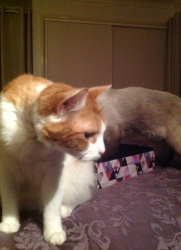 I am supposed to pass this award on, but my pain tolerance won’t last much longer on the computer, and further box wars are breaking out. It seems Picasso wants to write too… or I am receiving notice that it is exactly 1 hour and 45 minutes until something new must appear in their feed bowl.
I am supposed to pass this award on, but my pain tolerance won’t last much longer on the computer, and further box wars are breaking out. It seems Picasso wants to write too… or I am receiving notice that it is exactly 1 hour and 45 minutes until something new must appear in their feed bowl.
Madeline has already listed most of the people I would pass the award onto, so I encourage you to read the originating post and get to know those writers. They are friendly, not aloof, and should your week go wobbly… and if Facebook makes you want to punch it in it’s electronic nose… they are supportive people who will be there to give you the seven hugs you need. Go visit and reap the benefits of new friendship and new wisdom.
P.S. Monet won. The box is his. My manuscript is homeless. Art – 1 Literature – 0!
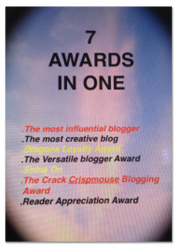
This article / blog post is Copyright Cate Russell-Cole 2014. All rights are reserved Internationally. You may not reproduce it in any form, in part of whole, without Cate’s prior written permission. That includes usage in forms such as print, audio and digital imaging including pdf, jpg, png etc. A fee may be requested for re-using her work if it is for a commercial venture.
Link sharing and Pinterest pins are most welcome as long as Cate is the attributed Author.
Filed under: What's On Tagged: award, bad week, blog, discouragement, encouragement, Facebook, Madeline Sharples, stress, writer, writing








How NOT to look like a total loser on #Twitter: Social Media Professionalism
 There are services out there which are incredibly useful to have, particularly if you like proper stats on where you’re at. However, openly advertising that you use these services can make you look like a woeful failure if you don’t have a massive following. For example:
There are services out there which are incredibly useful to have, particularly if you like proper stats on where you’re at. However, openly advertising that you use these services can make you look like a woeful failure if you don’t have a massive following. For example:

That was one of the more cheery ones I saw this morning. 224 people walking away is a lot! I would be worrying if these were my stats.
I see numerous notices like this go through my stream every day. They are auto-generated. All services spit out these ads. If I use one, I go into Twitter fast and delete them. Plus, if I pay to subscribe to a service, I will remove all automatic options to have these services air my private laundry at their will.
I would never advocate not using these sites to clean up your following. They also removed dormant accounts and have many benefits. They are too good to ignore. Benefits include:
Finding inactive users and your unfollowers.
Finding relevant users to follow.
Keeping track of how your social media updates affect your follower/unfollower stats.
Checking the relationship between any accounts and doing a whole lot more (for a price on services this good).
I would recommend you never auto-follow anyone using them though: not only do automatic DMs mean I know you are insincere and have never seen me; you also follow every spammer out there, thinking you’ve got great stats when you’ve only got snake oil merchants and porn…
So be aware of who advertises what in your Twitter stream and how it makes you look. You won’t be sorry you did.
P.S. May I present to you the other side of the argument? Note that when you have many followers, this isn’t an issue but if you have a small number, the above still applies.
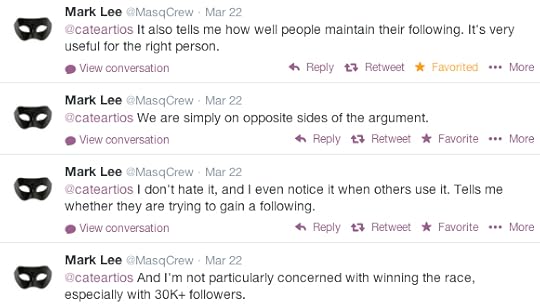
This blog post by Cate Russell-Cole is licensed under a Creative Commons Attribution-NonCommercial-ShareAlike 3.0 Unported License. You are free to share and adapt it.
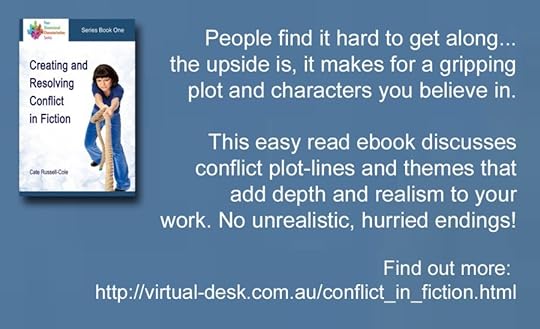
Filed under: Writing Resources Tagged: goals, ideas, marketing, problem solving, promotion, social media, success, Twitter, writer, writing








March 25, 2014
Do You Write by Heart or Head? Technique Overload
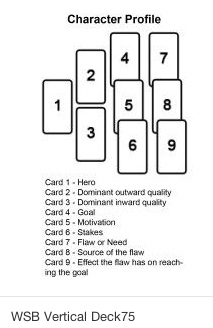
Complexities that put me off my game.
When does studying the craft of writing stop you or inhibit your work? That is a question which some of us need to ask. Writing has become more than a plotter or pantser issue, it can come down to science vs your instincts as a bard.
I like to know I am doing things the right way. However, in branching back out into fiction, I am finding the more I read about what to include, the more nervous I am becoming with my writing. I look at images on Pinterest, like the one on the right, feeling bemused, hemmed in, inadequate and I am stunned into inaction by a fear of failure. What if the “right” way is not my way? Jane Austen wrote without all this!
Since I originally studied writing, main characters have become protagonists and there are also antagonists, contagonists, deuteragonists… what? Deuteragonists are the main secondary characters. Why can’t we just say that! How many aspiring authors are being scared away? I often get the feeling you I am being told to be perfect and write a specific way, rather than being allowed to just write down that story I need to tell.
There are things I need at the beginning: plot arcs, descriptions, body language, emotional reactions which are realistic, archetypes as a guideline and character profiles (such as the Enneagram); however, I need to begin to ignore many technical articles or stash them for later in the writing process.
Things that freak me out when I am writing a new story for the first time:
Dos and Don’ts for the Last 10,000 words of your story.
What you should write and when : hook, plot point, response, mid point, attack, plot point, climax, resolution… complete nervous breakdown?
Structuring Your Story’s Scenes, Pt. 5 (What if I don’t fit neatly into all that? Did I fail?)
200,000,000 ways to say that, went, and or whatever, which makes me feel like I need to watch every word as it comes out.
Revealing secrets, pivotal information etc. for maximum impact on a very detailed, precise manner. (What if I don’t fit neatly into all that? I really stink at this, don’t I!)
The First Five Pages. A writer’s guide to staying out of the rejection pile. (That has to come with editing, you can’t get that right, straight off the bat!)
The most annoying type of story conflict / the most hated antagonist readers will throw the book down after reading etc.
You get the picture.
My answer: learn slowly as you go; be open to new ideas but don’t let them mash you into a one-size-fits-all, formatted cliché like a Hollywood blockbuster movie… You need to get that story down before you can start working on perfecting it.
This blog post by Cate Russell-Cole is licensed under a Creative Commons Attribution-NonCommercial-ShareAlike 3.0 Unported License. You are free to share and adapt it.
Filed under: "Writing Lessons from the Writing Life", Author First Aid Tagged: antagonists, attack, author, books, characterisation, characters, climax, complex, conflict, contagonists, creativity, deuteragonists, failure, fear of failure, fiction, first drafts, hook, ideas, inadequate, inspiration, mid point, plot, plot point, problem solving, resolution, response, secondary characters, success, Technique Overload, writer, writing








March 23, 2014
#Blogging and Realistic Goals: Don’t Be Crushed by the Pressure
 In 2012 I discovered A Round of Words in 80 Days (ROW80). One thing we all have in common with our writing is life sure does get in the way! It’s unavoidable and you just have to go with it. Even taking a day off to have fun can be necessary in our creative lives. The trick is, to do it without the guilt… and in people’s update posts, I frequently read an awful lot of guilt!
In 2012 I discovered A Round of Words in 80 Days (ROW80). One thing we all have in common with our writing is life sure does get in the way! It’s unavoidable and you just have to go with it. Even taking a day off to have fun can be necessary in our creative lives. The trick is, to do it without the guilt… and in people’s update posts, I frequently read an awful lot of guilt!
ROW80 shares the same blogging philosophy I have. “We are all different and we all have different demands on our time. Why should we all have the same goal? The simple answer is that we shouldn’t. If you want to be a writer, then you have to be able to roll with the punches and adapt to your changing circumstances. If that means changing your goals when your life blows up, so be it. ROW80 is the challenge that champions the marriage of writing and real life.” (The next round starts in early April.)
I like the emphasis on the goals being achievable. That is the secret ingredient to any goal. There must be flexibility and a sense of reality. However, despite how Kait Nolan has emphasized the easy-going nature of the challenge, I keep seeing writers listing masses of goals: far more than 80 days worth! NaNoWriMo is another example that concerns me in as far as mental and creative health are concerned. The word count allows for no days off for an entire month and a very high output. It’s too short and writers stress, particularly when they hit plot problems and again, real life gets in the way. Why we are so insistent on deliberately placing ourselves under high-achievement related stress?
 The happiest bloggers seem to be the ones who have three goals at the most. These goals aren’t back-breaking and they have a balanced attitude which accepts that some days they may fail; some days they may come close; some days they will achieve above and beyond and that is all good. The strategy which brings a cheer from me, is seeing writers list the rewards they will give themselves on achieving their goals. A small treat, some ‘me’ time, a fun activity which refreshes and pulls them away from their desk. It’s a great idea. I love it!
The happiest bloggers seem to be the ones who have three goals at the most. These goals aren’t back-breaking and they have a balanced attitude which accepts that some days they may fail; some days they may come close; some days they will achieve above and beyond and that is all good. The strategy which brings a cheer from me, is seeing writers list the rewards they will give themselves on achieving their goals. A small treat, some ‘me’ time, a fun activity which refreshes and pulls them away from their desk. It’s a great idea. I love it!
Reaching your goals and dreams by making small changes, seems to work the best for most people. Trying to revolutionize our entire lives in one effort leaves us tired and discouraged. Small changes are the ones that stick. They are less likely to fizzle into failures and regrets.
Go easy and be kind to yourself!
 Work, family, finances, holidays, sickness and the occasional crisis will always be there to keep you away from putting words on paper. Your success as a writer depends as much on how you deal with that, as it does on how much output you have. As a writer there is a massive laundry list of demands you are supposed to meet to succeed, plus I know how easy it is to get enthusiastically carried away with everything you want to achieve. However, please do take the time to step back, reassess your direction and see if you need to cut back on your goals to maximize your creative energy. It is not a sign of failure to do that, it’s a sign of wisdom.
Work, family, finances, holidays, sickness and the occasional crisis will always be there to keep you away from putting words on paper. Your success as a writer depends as much on how you deal with that, as it does on how much output you have. As a writer there is a massive laundry list of demands you are supposed to meet to succeed, plus I know how easy it is to get enthusiastically carried away with everything you want to achieve. However, please do take the time to step back, reassess your direction and see if you need to cut back on your goals to maximize your creative energy. It is not a sign of failure to do that, it’s a sign of wisdom.
This blog post is Copyright Cate Russell-Cole 2012 and is an excerpt from the book “Phoenix Rising: Conquering the Stresses of the Writing Life.“
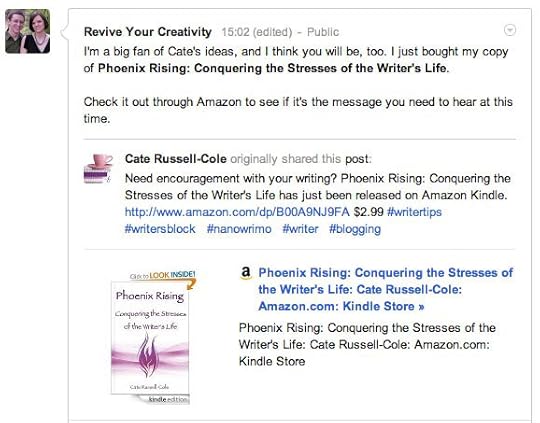
All rights are reserved Internationally. You may not reproduce it in any form, in part of whole, without Cate’s prior written permission. That includes usage in forms such as print, audio and digital imaging including pdf, jpg, png etc. A fee may be requested for re-using her work if it is for a commercial venture.
Link sharing and Pinterest pins are most welcome as long as Cate is the attributed Author.
The sunrise is a purchased istockphoto.com image licensed to me. You are not legally able to re-use it in any manner, neither may you adapt it without risking litigation from the source.
Filed under: What's On Tagged: blog, blogging, burn out, challenge, creativity, encouragement, goals, hectic, passion, pressure, problem solving, real life, ROW80, stress, stress management, success, support, writer, writing









